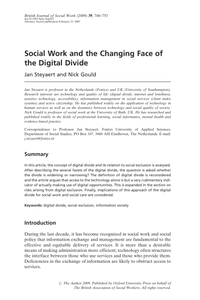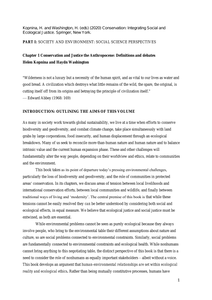Subjects such as public finance, corporate finance, banking theory, risk management and management accounting are all largely based on the neoclassical approach. Most recent appointed professors have started their work with ideas based on a neoclassical fundament and its methodological preferences. Neoclassical economic thinking is not bad in itself. It has brought much good, even. However, now the downside of neoclassical theory has occurred. Failing financial markets have plunged the global economy into crisis. It is, therefore, high time for a debate on economic concepts as taught in universities and business schools. Are students really trained to think critically about economic theory and the consequences when economic theories are put into practice?
MULTIFILE

Corporate Social Responsibility affects Corporate Governance as it stretches the accountability of companies beyond its traditional boundaries. This however may conflict with the corporate objective of maximizing stockholder wealth. The paper provides an overview of various academic theories and corporate attitudes on this issue and discusses the merits and disadvantages of the two main governance modes: the stockholder mode and the stakeholder mode.
DOCUMENT

"Snapt u wat u ziet? Of zijn we gevangen in een nieuwe ideologie? " Lector Frans van der Reep daagde de toehoorders bij de Pieter Teyler van der Hulstlezing bij Inholland Haarlem uit tot kritische reflectie op innovatie en het recht op offline leven. "Pas vanuit een begrip wat er gebeurt als gevolg van nieuwe tech, en dat wij de crowd zijn, kunnen we positie kiezen en onszelf echt organiseren."
MULTIFILE

Dit artikel gaat in op de zogenaamde digitale kloof en beschrijft hoe met de verandering van die digitale kloof ook de bijhorende sociale interventies moeten wijzigen.
DOCUMENT

As many in society work towards global sustainability, we live at a time when efforts to conserve biodiversity and geodiversity, and combat climate change, take place simultaneously with land grabs by large corporations, food insecurity, and human displacement through an ecological breakdown. Many of us seek to reconcile more-than-human nature and human nature and to balance intrinsic value and the current human expansion phase. These and other challenges will fundamentally alter the way people, depending on their worldview and ethics, relate to communities and the environment. While environmental problems cannot be seen as purely ecological because they always involve people, who bring to the environmental table their different assumptions about nature and culture, so are social problems connected to environmental constraints. Similarly, social problems are fundamentally connected to environmental constraints and ecological health. While nonhumans cannot bring anything to this negotiating table, the distinct perspective of this book is that there is a need to consider the role of nonhumans as equally important stakeholders – albeit without a voice. This book develops an argument that human-environmental relationships are set within ecological reality and ecological ethics. Rather than being mutually constitutive processes, humans have obligate dependence on nature, not vice versa. We argue that over-arching ecological ethics is necessary to underpin conservation in the long-term. This requires a holistic ‘justice’, where both social justice (for humans) and ecological justice (for nature) are entwined. However, given the escalating environmental crisis and major extinction event we face, and given that social justice has been dominant for centuries, we believe that in many cases ecojustice will need to be prioritized. This will depend on the situation, but we feel that under ecological ethics, holistic ethics cannot always allow social justice to dominate, hence there is an urgent need to prioritize ecojustice today. Accordingly, this book will deal with questions of both social and ecological justice, putting forth the idea that justice for both humans and nonhumans and their habitats can only be achieved simultaneously. This book will explore the following questions: What is the relationship between social and ecological justice? How might we integrate social and ecological justice? What are the major barriers to achieving this simultaneous justice? How can these barriers be overcome? What are the major debates in conservation relevant to this? doi: 10.1007/978-3-030-13905-6 LinkedIn: https://www.linkedin.com/in/helenkopnina/
MULTIFILE

In today’s intellectual capital literature, we see a shift from identifying intangibles towards understanding the dynamics of value creation. As it is not clear what “dynamic” stands for, the aim of this explorative and conceptual paper is to contribute to a better understanding of the dynamic dimension of IC. Based on a review of the early IC literature, the dynamic dimension (or dynamics) of intellectual capital seems to refer to the logic that value creation is the product of interaction between different types of (intangible) resources. As the idea of value creation through combination of knowledge resources is closely related to the New Growth Theory (Romer, 1990, 1994), this paper explores the New Growth Theory and its implications for the dynamic dimension of intellectual capital. Based on the exploration of the New Growth Theory, a conceptual model is presented in which the elements that constitute the dynamic dimension of intellectual capital are integrated. These elements are ideas, things, the process of knowledge creation, the process of continuous innovation, and institutions. The main conclusion of this paper is that the concept of knowledge is more closely related to the dynamic dimension of IC, than the concept of intellectual capital. Therefore, further research would probably benefit from approaching this topic from a knowledge management point of view. It is suggested that further research should focus on exploring the metaphors that contribute to a better understanding of the dynamics of IC, on the contribution that ideas can make to increase the effectiveness of knowledge management, and finally on the institutional arrangements that support the process of knowledge creation and innovation.
DOCUMENT
Recent developments in digital technology and consumer culture have created new opportunities for retail and brand event concepts which create value by offering more than solely marketing or transactions, but rather a place where passion is shared. This chapter will define the concept of ‘fashion space’ and consumer experience, and delves into strategies for creating experiences that both align with a brand’s ethos and identity and build brand communities. It will provide insight on creating strong shared brand experiences that integrate physical and digital spaces, AR and VR. These insights can be used for consumer spaces but also for media and buyer events, runway shows, test labs and showrooms. Since its launch in 2007, international fashion brand COS has focused on creating fashion spaces that build and reinforce a COS fashion community. COS retail stores with their extraordinary architecture, both traditional and contemporary, contribute stories and facilitate intense brand experiences. Moreover, COS’ dedication to share the artistic inspirations of its people led to collaborating on interactive and multi-sensory installations which allow consumers to affectively connect to the brand’s personality and values. Thus, the brand was able to establish itself firmly in the lifestyle of its customers, facilitating and developing their aesthetics and values. This is an Accepted Manuscript of a book chapter published by Routledge/CRC Press in "Communicating Fashion Brands. Theoretical and Practical Perspectives" on 03-03-2020, available online: https://www.routledge.com/Communicating-Fashion-Brands-Theoretical-and-Practical-Perspectives/Huggard-Cope/p/book/9781138613560. LinkedIn: https://nl.linkedin.com/in/overdiek12345
MULTIFILE

Building on the Millennium Development Goals, Education for Sustainable Development (ESD) and Education for Sustainable Development Goals (ESDG) were established. Despite the willingness of many educational institutions worldwide to embrace the SDGs, given escalating sustainability challenges, this article questions whether ESDG is desirable as “an education for the future”. Many challenges outlined by the SDGs are supposed to be solved by “inclusive” or “sustainable” economic growth, assuming that economic growth can be conveniently decoupled from resource consumption. Yet, the current hegemony of the sustainability-through-growth paradigm has actually increased inequalities and pressure on natural resources, exacerbating biodiversity loss, climate change and resulting social tensions. With unreflective support for growth, far from challenging the status quo, the SDGs and consequently, the ESDGs, condone continuing environmental exploitation, depriving millions of species of their right to flourish, and impoverishing future generations. This article creates greater awareness of the paradoxes of sustainable development and encourages teaching for sustainability through various examples of alternative education that emphasizes planetary ethic and degrowth. The alternatives include Indigenous learning, ecopedagogy, ecocentric education, education for steady-state and circular economy, empowerment and liberation. “This is an Accepted Manuscript of an article published by Taylor & Francis in 'Journal of Environmental Education' on 01/20/20, available online: https://www.tandfonline.com/doi/full/10.1080/00958964.2019.1710444 LinkedIn: https://www.linkedin.com/in/helenkopnina/
MULTIFILE

A Manifesto The group of some 17 participants interrupted the UDHR text in real time, infusing it with inclusive terminology, queering its binary language and expanding its gaze to other lifebeings, making it a manifesto for a new world. The newly formulated Universal Declaration of Human and More-Than-Human Rights and Responsibility for a New World would be the manifesto for an alliance of those who insisted on an end to capitalist practices and their destructive effects on the planet.
MULTIFILE
The sources of productivity have always been the main subject of economic debate because they are the main determinants of profitability and competitiveness. In order to improve productivity we should be able to identify the sources of productivity. This article presents a method for measuring the sources of knowledge productivity in order to give direction to knowledge management initiatives. The method is based on a theoretical framework which combines two different perspectives (economic and process) on knowledge productivity. This article presents the methodological and theoretical framework, the initial design of the method and the results of the first two case studies. The relevance of this article is that it combines the concepts of knowledge management and intellectual capital measurement in the relatively new concept of knowledge productivity.
DOCUMENT
